Be Part of a Green Team Story
A Unique Opportunity to Invest In The Future
Dialogue with Steve Moody
Director of International School of Tianjin (IST)
成为绿色环保小组的一员
向未来投资的特殊机会
和Steve Moody 的对话
天津经济技术开发区国际学校天津分校校长
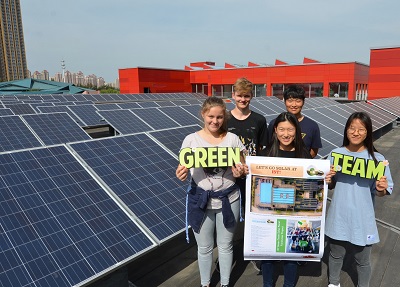 如果你鸟瞰天津经济技术开发区国际学校天津分校,您可能会发现一些不同的东西。 380个太阳能电池板正在吸收夏日最后的阳光。津卫商务很幸运地听IST校长Steve Moody讲述了整个项目的产生和发展过程,以及背后的主导者是谁。
如果你鸟瞰天津经济技术开发区国际学校天津分校,您可能会发现一些不同的东西。 380个太阳能电池板正在吸收夏日最后的阳光。津卫商务很幸运地听IST校长Steve Moody讲述了整个项目的产生和发展过程,以及背后的主导者是谁。
什么是绿色环保小组太阳能电池板项目?
这是由学生发起的促进世界可持续发展的环保活动。我们学校中学课程设置里包括了学生社区服务,因此整个学校的所有学生都会参与到各种特定的社区服务和活动中。
学生经常会提出他们自己的一些想法,他们想知道学校能够接受什么方式的活动。大约一年前,绿色环保小组研究了让如何能让IST变得更加环保的各种可能性。他们提出装太阳能电池板作为潜在项目的想法,并征求了我们的意见和建议,以及是否可以这样做的可能性。这是一个由社区资助的项目,旨在让我们的学校节约能源,变得更具可持续性。
当你提出这个想法时,学校理事会的反应是什么?
理事会一直在考虑开展某个环保项目,所以当我们向他们提出学生们的想法时,他们当然非常热情地支持。所有理事会成员甚至承诺亲自捐款。
太阳能电池板如何在学校中发挥作用?
我们考察了我们的能源消耗,实际上认为我们是可以负担得起的。我们发现,在指定的建筑物上,我们可以安装350到400个太阳能电池板,这些太阳能电池板能够产生足够的电力,用于学校汉楼的照明,大约为18000个单位。截至到截稿日,我们已经收到了380块太阳能板里的近170块太阳能板的赞助,还有大概200多块需要寻求赞助。绿色环保小组的同学们自己拉赞助,家长们也在帮助宣传。到目前为止,大约100%的赞助来自于IST的学生、家长以及教职员工,虽然也有一两家公司赞助我们。
太阳能电池板是否会产生足够的电力,以便在冬季为学校提供必要的电力?
不,绝对不可能,并且肯定不会提供足以给整个建筑物供暖的电力。当然,每年的暑假这些太阳能板可以产生大量的剩余电力,幸运的是,我们可以将这些多余的能源卖给政府,学校可以用这笔钱来抵消冬季增加的取暖费用。
它是中国第一所计划以绿色能源为动力的国际学校吗?
我相信中国的许多学校已经采取了各种措施。然而,在天津,我们知道我们是唯一一家。
绿色能源对环境有何影响?
显然二氧化碳排放量减少了。 自从我们在8月21日开始发电以来,我们已经节省了大约40棵树和减少了几吨二氧化碳的排放。太阳能板安装于屋顶上,因此无法直接看到它们。因此我们特意设立了一个显示屏,所有的数据都会显示给大家,它是全天测量的,因此您可以看到高峰值和低峰时间。这是一种非常实用和直观的展示方式,以便孩子理解。作为一所学校,我们坚持自己的理念,所有的家长和老师都愿意支持。
IST在学校内实施了哪些其他绿色倡议?
有很多小事情一直在进行,例如整个学校都有回收站,我们将普通垃圾和有机垃圾分开。我相信我们的目标是成为中国第一所将所有自助餐包装改为可生物降解材料的国际学校。 学校的所有照明灯改为LED二级管,改变窗户材料以改善隔热效果,这意味着我们使用更少的能源,减少纸张的使用并将所有通讯方式转移为数字化方式。我们每年都在学校参与植树活动,积极支持天津市政府的各项环保举措。
是什么让IST的理事会如此支持?
这真的很简单。我们学校是一所非营利性学校,因此在决定支出时,关键是什么对学生最有利。他们也都是父母,他们的孩子都在学校就读。我们的理念是将服务推向更广泛的社区和环境。
未来我们可以期待从IST看到哪些项目?
最终,我们计划是将太阳能板扩展到整个学校,并在另一栋建筑上放置更多的太阳能发电板。天津还面临着另一个问题,水。水的再利用并不是太难,但问题是降雨 - 这一切都是一次性的,你不能存储。当然,我们多年前将所有厕所马桶换成全冲和半冲模式来节约用水,显而易见随着时间的推移,我们采取了一些措施, 但主要问题还是存储。我们期待着学生们提出新的建议。还有的学生已经制作了小型的发电风车,我们已经在考虑安装或购买的可能性。这些都与孩子们学习如何在学校节约能源有关。对于我们来说,看到社区对学校的反应,这是一项有趣的工作,我们希望未来的企业能够加入并支持这项公益事业。
你最自豪的是这项倡议的哪一部分?
国际学校总是谈论全球公民身份。您经常可以向学生询问他们在领导力方面获得的成长。 希望其他学生也能从团队中学习。
我感到自豪的是,学生们推动了这一举措,这是他们最初的想法。 他们做了研究。 他们发现了什么可行,哪些不可行。 他们把整个学校社区宁聚在一起,实现了目标。我希望其他学生能从这个绿色环保小组的努力中学习,并且清楚地知道他们也可以发挥重要作用。 每人一小步,社会进步一大步。
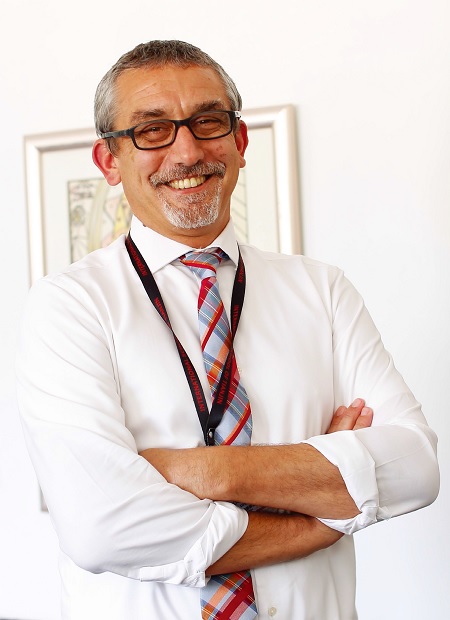 If you look at the International School of Tianjin from the sky, you may notice something different. 380 solar panels lie soaking up the last of the summer sun in a brilliant attempt to reduce IST’s environmental footprint. Business Tianjin was lucky enough to speak to the Director of IST, Steve Moody, about how this bright idea came about and who the masterminds behind it were.
If you look at the International School of Tianjin from the sky, you may notice something different. 380 solar panels lie soaking up the last of the summer sun in a brilliant attempt to reduce IST’s environmental footprint. Business Tianjin was lucky enough to speak to the Director of IST, Steve Moody, about how this bright idea came about and who the masterminds behind it were.
What is the Green Team Solar Panel Project?
It’s a student-initiated activity to promote sustainability in our world. Our curriculum includes a commitment to student service, and all students are therefore involved in some kind of service activity. When they are young, a lot of these experiences are planned and guided by teachers but as they move up through the school, they take greater personal responsibility. In our middle and lower high school, we have Action Groups, or service initiatives generated by student ideas and interests. These teams direct their efforts towards various service causes of interest to them, including working with orphanages and animal shelters, reading with and mentoring younger students, Alzheimer’s support, and of course sustainability projects.
Students often come to me and talk about the ideas they have, wanting to know if the school will support them. Around a year ago, the Green Team action group asked me about the possibility of making IST a little greener and what our community could do about it. They then suggested the idea of solar panels as being a potential project and asked whether they could pursue the idea. I spoke to our advancement office here at school and also the board of governors. Together with the students we were able to initiate the project, a community funded initiative to make our school save energy and to promote sustainability in general.
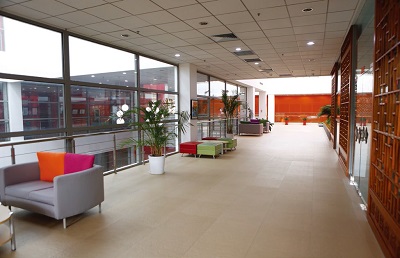 What was the board’s reaction when you approached them with this idea?
What was the board’s reaction when you approached them with this idea?
It’s not necessarily the culture of the local community or international business community to give money to schools to support these kinds of projects and our school had never previously sought outside funding, beyond normal tuition of course. The IST Board had been considering advancement project options, so when we came to them with the idea that a student action group was looking to promote a sustainability initiative, they were very enthusiastic in supporting the project. All board members even committed to making a personal contribution to launch the project.
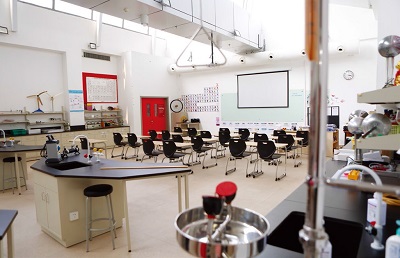 How do the solar panels work in the school?
How do the solar panels work in the school?
We looked at our energy consumption and what we thought we could realistically afford if indeed the community didn’t step up to support the project and the Board had to underwrite it. We found out that we could probably fit somewhere between 350 and 400 solar panels on our Han Building and that they would generate enough energy to light the Han Building, which is about 18,000 m2. The Green Team have thus far received sponsorship for around 170 of the total 380 solar panels included in the plan but are still looking to solicit sponsorship for the rest. The students themselves actively promoted the project in our community, with parents also spreading the word. The vast majority of the panels sold so far have been to IST students, parents and staff members, and our graduating class bought five! There have been one or two companies who have kindly sponsored panels, but primarily funding to date has been internal.
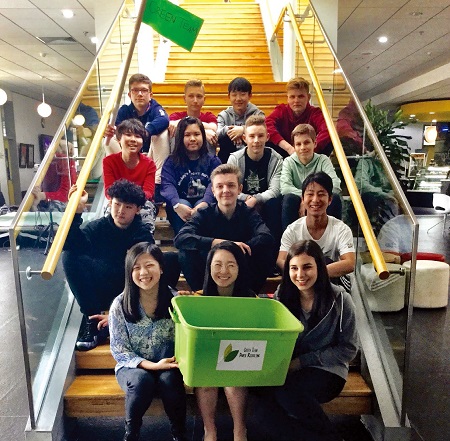 Will the solar panels produce enough electricity to provide schools with the necessary electricity during winter months?
Will the solar panels produce enough electricity to provide schools with the necessary electricity during winter months?
No, definitely not, and there was certainly never going to be enough to provide electricity to heat the entire building. Though it is to be said, Tianjin has a reasonable share of blue skies during the winter months! There are of course times of the year when we generate a lot of electricity, and especially during the summer months when school is closed. Fortunately excess energy can be sold back to the government so the school can use that money to counteract the increased heating costs and reduced power generation during the winter months.
Is it the first international school in China that is to be powered by Green energy?
I’m sure there are schools in China that have taken various steps in terms of sustainable practices. In Tianjin, however, we know we are the first to introduce solar panels. The thing with clean energy is that it generally, unfortunately, requires a significant upfront capital investment that you must then recoup over time. This means that you need strong capital reserves and cash flow to underwrite the investment. In the case of the solar panels the payback will take about eight years – in terms of capital investment. The environmental return is instant! The message is that you have to invest in the future.
What impact will producing green energy have on the environment?
There’s obviously a reduction in the CO2 emissions. In fact, we have a television monitor that displays the power generated and the environmental impact of the savings. Thus far our panels have effectively saved around 40 trees and several tonnes of CO2 emissions – that’s in addition to savings on electricity costs. The readings are displayed throughout the day so students can see when the peak and low production hours are. It’s a great visual learning opportunity for the students showing in real time that we really are making a difference. The panels are on the roof so they aren’t immediately visible on a daily basis. From that point of view, the monitor is a really practical and visible way of helping children see that as a school we do stand by our philosophy and that parents and teachers are willing to offer support.
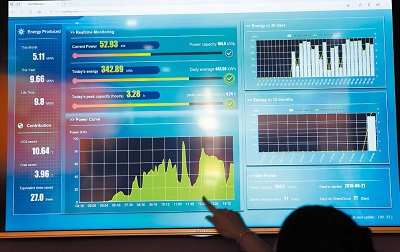 What other green initiatives has IST implemented within the school?
What other green initiatives has IST implemented within the school?
There are lots of little things that go on all the time, for example, there are recycling stations throughout the school, and we separate our trash and organic waste. I believe we are one of the first schools in China to change all of our cafeteria packaging to biodegradable materials. We have also done things like changing all the lightning in the school to LED; re-clad our main building exterior and replaced the windows and doors to improve insulation, which means we use less energy; and doing away with paper newsletters and moving everything to digital. We also participate in tree-planting every year at the school and actively support the Tianjin government initiatives.
What makes IST’s board so supportive?
That’s pretty simple really. Our school’s a genuine non-profit school, so when it comes to making decisions about expenditure, it’s all about what’s best for the students and so all surpluses are reinvested into the school. Our Board members are also parents and they all have children in the school so they want what is best for children. Our philosophy drives the service to the wider community and to the environment, so when your mission states that this is what you’re going to do, the board cannot refuse to support it. Also, anything that is driven by students tends to get a strong level of support, especially when they go in and pitch their ideas themselves.
 Photo by Trey Craig
Photo by Trey Craig
What future projects can we expect to see from IST?
Eventually, the plan is to expand panels across the school placing more panels on the other building. Tianjin has another problem too, namely water. Recycling water isn’t too difficult but the problem is rainfall – it all comes at once and you can’t store it. Of course, we swapped our toilets years ago to half flush/full flush, but the problem is mainly storage. We’re still thinking about this one.
We also have some students creating compost reusing some of the organic waste we use at school and ultimately plan to use it on our gardens. Other students have built prototype windmills – power generating windmills - and we’ve looked at the possibility of installing or purchasing ones that will actually make a difference. These are all tied to the ways in which the students learn about saving energy in school. This has been an interesting undertaking for us in terms of seeing what the community response has been both within and beyond the school, and we hope that industries and corporations will jump on board in future and be supportive.
https://www.istianjin.org/our-community/ist-solar-panel-project
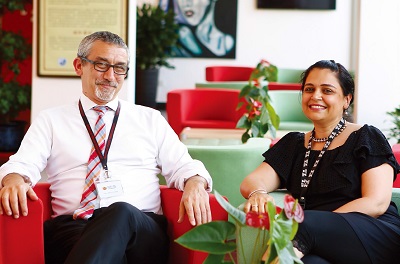 What part of this initiative are you most proud of?
What part of this initiative are you most proud of?
I’m proud of the fact that the students drove this initiative and it was their idea initially. They did the research. They found out what would work and what wouldn’t. They got together and made it happen. You can ask students about what opportunities they get in terms of leadership. Often they say no one ever listens to them, that they don’t get a chance. I think that’s the biggest learning from this project, and I hope that other students will learn from this group’s efforts and know that they too can make a significant difference. Small steps by everyone are all that is needed.
Do you think these projects attract students to come to your school instead of going to other schools?
I think students in any school will welcome an opportunity to be heard and have a voice. A big catchphrase amongst a lot of international schools is ‘agency’, giving students the opportunities to make decisions and take action. I think for a school that has taken small steps, any visible effort is attractive to parents who are looking to put their child in an environment which has values that they also hold dear.
When you get overwhelmed by the magnitude of a problem, it is often easy to give up. One of the advantages of a non-profit but parent governing board who don’t have a financial stake in the institution is that their only interest is to ensure that the school provides the best possible education for their children. But education is more than academics; it’s the broad range of experiences that children need to become global citizens. Our motto is working together, learning together, and acting together for our common future, and we really do try to live up to this intent.
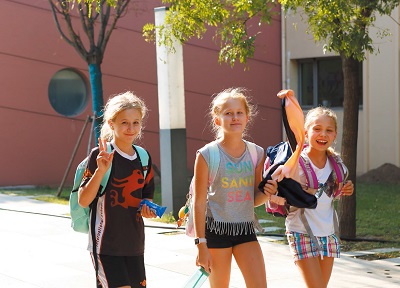 What are IST’s goals for the next 5-10 years?
What are IST’s goals for the next 5-10 years?
The foreign investment environment in China is changing all the time. IST is always seeking to promote and maintain enrolment because of the ongoing reduction in the number of expatriates. Localisation means there are fewer expats coming in. One of the challenges we and other schools face is that it’s very difficult to predict how many will come. Who is going to invest here and will they bring families? We are totally dependent on expat placement in Tianjin and if foreign companies decide not to come or decide to repatriate or localise, then we are immediately affected.
Our long-standing goals are obviously ensuring that we maintain a good stable enrolment and revenue source to ensure that the school continues to develop and provide world class services for students. Over the last few years we’ve been giving special attention to the development of STEM, Science, Technology, Engineering, and Math, and this is certainly an area closely allied to innovation and sustainability. We are also trying to be more inclusive of students with different and unique learning needs. Students often come to international environments but the learning support infrastructures that are available in our home countries are frequently unavailable in these contexts. International schools like our own therefore need to try very hard to support the many and varied needs of expatriate families and their children. And of course the promotion of global citizenship and international mindedness is at the heart of our every effort, and remains at the forefront of our mission and philosophy.
Thank you Mr. Moody for taking the time to speak to us. We were impressed not only at how the students themselves care enough about sustainability and the environment to initiate the Green Team Solar Panel Project, but also the encouragement provided by the board and staff members in allowing these students to have their voice heard. It truly is inspirational. We can’t wait to hear about more green initiatives and support of the wider community in future.